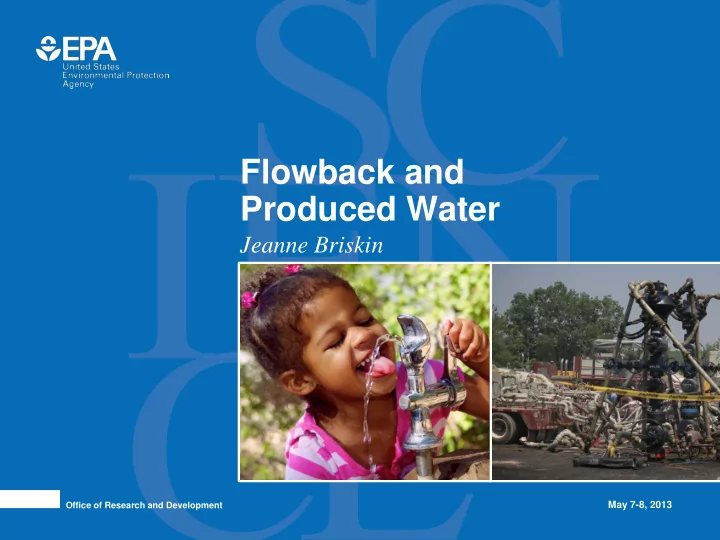

Flowback and Produced Water Jeanne Briskin May 7-8, 2013 Office of Research and Development
Flowback and Produced Water What are the possible impacts of surface spills on or near well pads of flowback and produced water on drinking water resources? 1
Research Projects • Composition of hydraulic fracturing wastewater – Literature Review – Well File Review • Frequency, severity and causes of hydraulic fracturing-related spills – Spills Database Analysis – Service Company Analysis – Well File Review 2
Charge Question #9 Please identify literature or specific data on the composition of flowback and produced water. 3
Wastewater Composition Data • Report by NY State Department of Environmental Conservation (NYSDEC) : (Revised Draft) Supplemental Generic Environmental Impact Statement (SGEIS) on the Oil, Gas and Solution Mining Regulatory Program, 2011 • Report by Gas Technology Institute (GTI) for Marcellus Shale Coalition (MSC) : Sampling and Analysis of Water Streams Associated with the Development of Marcellus Shale Gas, 2009 • Well File Review: Sampling Data for Flowback and Produced Water Provided to EPA by Nine Oil and Gas Well Operators, 2011 See Tables A-3 and A-4 of the Progress Report 4
Wastewater Composition Data NYSDEC SGEIS GTI/MSC Report Well File Review No. of unique wells • Not provided • 19 • 81 • PA and WV • PA and WV • Various basins across Location of wells (Marcellus Shale) (Marcellus Shale) the country • Data provided by well • Marcellus Shale Gas • Data provided by well Data source operators Coalition member operator companies • Most are one sample • 1, 5, 14, 90 days after • Data varies widely in per well hydraulic fracturing terms of number of Time-series data constituent sampling days per well • Metals • Metals • Metals • Few VOCs • VOCs and SVOCs • VOCs and SVOCs • Radium 226, 228 • Radium 226, 228 • Alcohols, glycols Analytes • Some acids • Some acids • Typical water quality • Typical water quality • Typical water quality parameters (e.g., TDS, parameters parameters hardness) 5
Wastewater Composition Data 6
Wastewater Composition • Flowback and produced water can include: – Injected chemicals – Reaction and/or degradation products – Hydrocarbons – Native formation fluid • Flowback and produced water are expected to vary based on different types of geology • Additional data needed 7
Technical Stakeholder Input* • Produced water quantity, duration and quality vary considerably between shale plays and can even vary geographically within the same play – Barnett: Large volumes of produced water; TDS and Chloride (Cl) increase significantly over time – Fayetteville: Relatively low Cl, Magnesium (Mg) and Total Disolved Solids (TDS) – Haynesville: High Calcium (Ca), Mg, Cl, TDS and Total Suspended Solids (TSS) – Marcellus: High Sodium (Na), Ca, Mg, Cl, TDS and specific conductance; often high Barium and Strontium • Salinity of produced water increases over time 8 *Technical Workshop 2011, Technical Roundtable 2012
Charge Question #10 Please suggest ways for the EPA to use data from the spills database analysis or other data to more comprehensively assess how spills or leaks may impact drinking water resources. 9
Spills Database Analysis Identify Data Sources • State and federal spill databases • Information provided by well operators and hydraulic fracturing service companies Identify Hydraulic Fracturing-Related Spills • Onsite spills of hydraulic fracturing fluids/chemicals, flowback and produced water Analyze Data from Relevant Spills • Cause, chemical/substance spilled, estimated/reported spill volume, reported impact (if any) 10
Spills Database Analysis States were selected based on the number of 11 wells entered into FracFocus as of Feb. 2012
Data Sources STATE DATABASE Arkansas Department of Environmental Quality Complaints and Inspections Database Colorado Oil and Gas Conservation Commission COGIS - Spill/Release Database Louisiana Department of Environmental Quality New Mexico Energy, Minerals and Natural Resources Department Spills and Pit Data North Dakota North Dakota Industrial Commission, Oil and Gas Division and the North Dakota Department of Health, Environmental Health Section Oklahoma Corporation Commission Pennsylvania Department of Environmental Protection Compliance Reporting Database Texas Railroad Commission H8 Spill Records Utah Department of Environmental Quality Division of Environmental Response and Remediation Wyoming Oil and Gas Conservation Commission Spill Database National data collected from the National Response Center 12
Scope of Analysis EPA is gathering information on: • Onsite spills, leaks, overflows and releases • Incidents that occurred between Jan. 1, 2006, and April 30, 2012 Incidents outside the current scope include: • Transportation-related spills • Spills from drilling activities • Air releases • Injection well disposal spills • Well construction and permitting violations 13
Technical Stakeholder Input* • Although companies have incident tracking systems, inconsistent terminology makes their use complicated • Additional sources of information suggested: – Industry SOPs for addressing spills under the reporting limit – Company “daily operations reports” – Additional state spills databases – Shale Water Research Center data from Rice University and Washington University 14 *Technical Workshop 2011, Technical Roundtable 2012
Challenges • Databases do not clearly identify hydraulic fracturing-related spills/releases • Variation in reporting for different states – Reporting limits vary by state – Difficult to categorize reported spills and to identify causes, chemical identity and volumes • Lack of electronic accessibility to state data 15
Charge Questions 9. Please identify literature or specific data on the composition of flowback and produced water. 10. Please suggest ways for the EPA to use data from the spills database analysis or other data to more comprehensively assess how spills or leaks may impact drinking water resources. 16
Recommend
More recommend